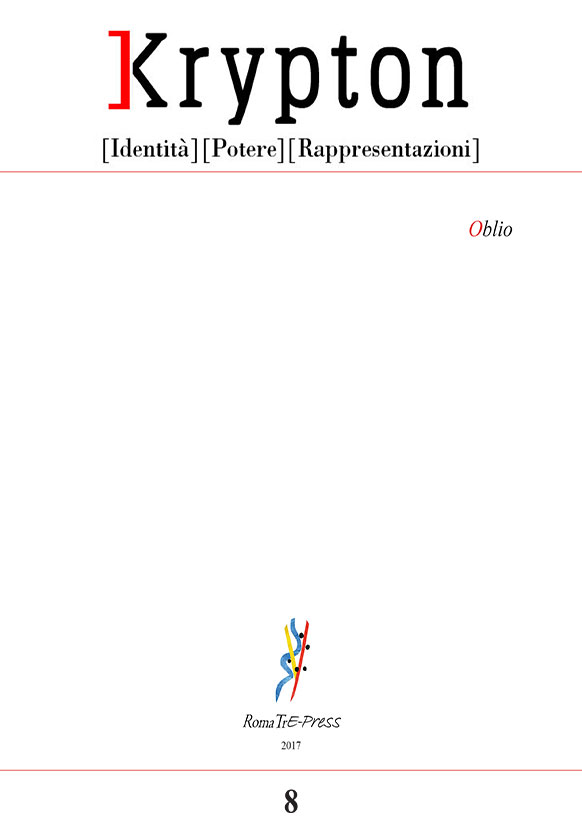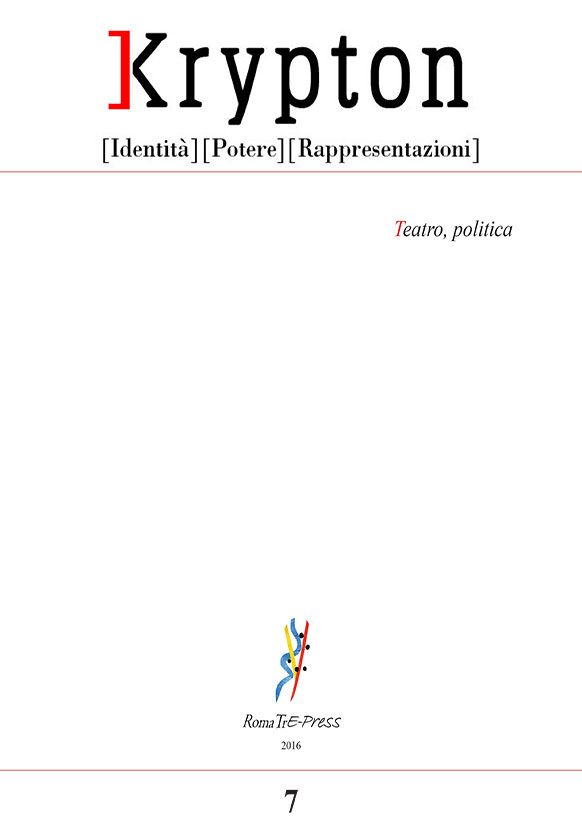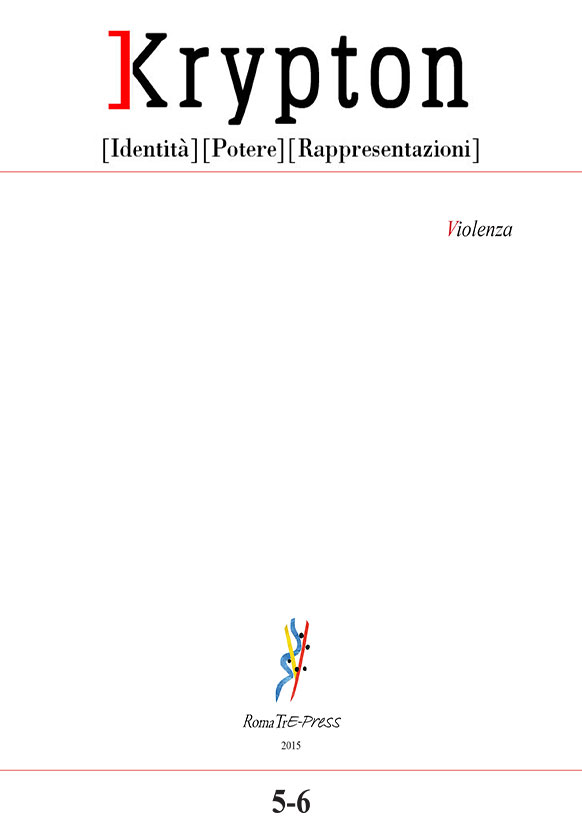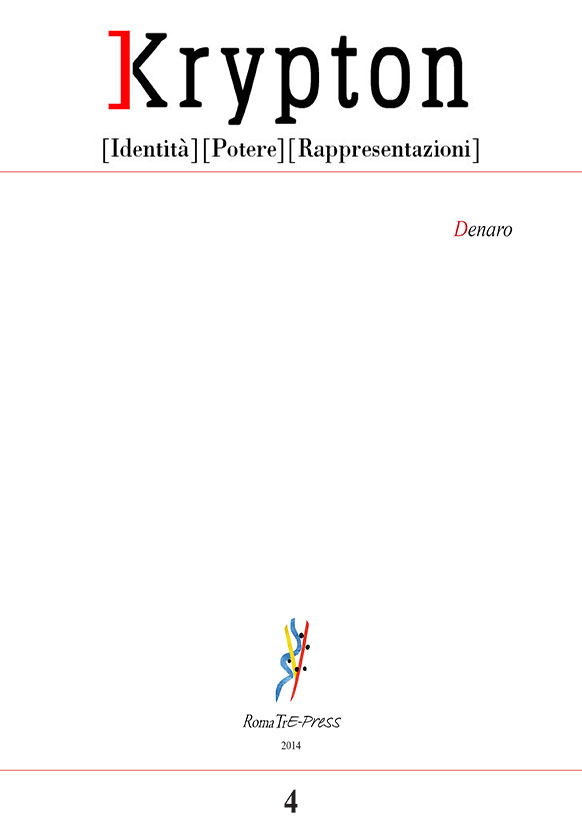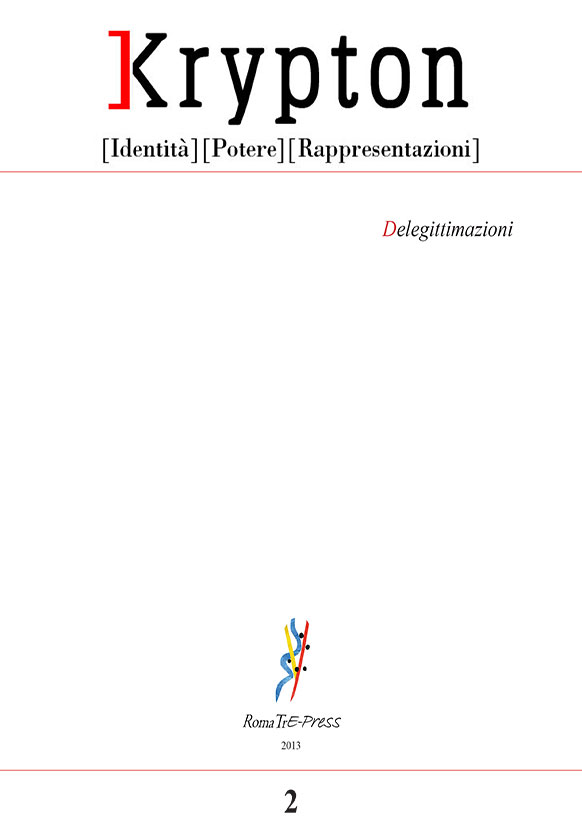Abstract
Periodico semestrale del Dipartimento di Lingue, Letterature e Culture Straniere
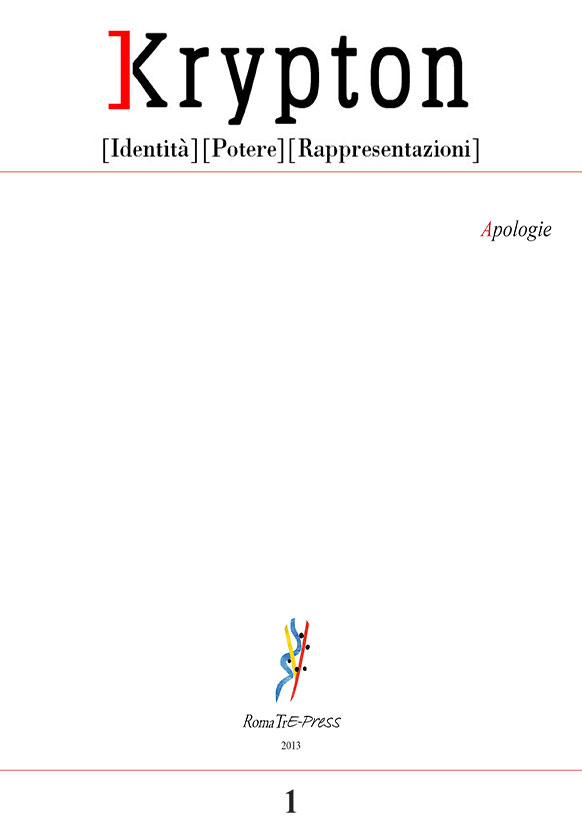
Periodico semestrale del Dipartimento di Lingue, Letterature e Culture Straniere
Per il tema del primo numero, la scelta è ricaduta sul concetto di apologia, con l’intenzione di indagarne, con diversi approcci e prospettive, le possibili forme e declinazioni (di qui la scelta del plurale Apologie), nella consapevolezza che, dalla filosofia classica greca agli scritti dei Padri della Chiesa, dalle diatribe medioevali e rinascimentali fino al declino dell’Ancien Régime, dai tempi moderni fino alle produzioni scritte o ad artefatti dell’estremo contemporaneo, difendere, legittimare, giustificare significa andare alla ricerca di argomentazioni convincenti e persuasive (la persuasione degli animi è parte fondante dell’apologia) e strutturare le stesse sulla scorta delle regole della retorica classica o di nuovi dispositivi, ma anche individuare avversari ideali che finiscono per costituire una ineliminabile presenza di retroguardia; l’apologia si può infatti definire come esposizione giustificativa della verità e celebrazione, come prodotto atto a persuadere ma anche, contestualmente, come esclusione dell’errore opposto. Senza considerare che lo strumento linguistico non è l’unico possibile: un peso rilevante, in una accezione larga di apologetica e di apologia, deve essere attribuito al mezzo iconografico; basti pensare a tutti quei cicli pittorici e scultorei che, direttamente o indirettamente riferibili alla volontà di un regnante, hanno dato forma visiva e plastica al potere e a ciò che si voleva dimostrare essere il suo legittimo esercizio, senza dimenticare del resto le nuove forme iconiche (video, film) celebrative di un potere istituito o occulto. Difesa e attacco, legittimazione e delegittimazione, rappresentano un atto unico, due facce della medesima medaglia, in grado di dirci molte cose circa il modo di concepire e di rappresentare persone e poteri.
Résumé:
A travers une lecture suivie et l’analyse de quelques pamphlets militants écrits par Loys Le Roy pendant les guerres de religion, cette étude essaie de reconstruire la vision de cet humaniste qui se dégage de sa réflexion portant à la fois sur la religion et la politique, afin d’en souligner le caractère composite, l’allure oscillatoire et le voisinage d’idées, parfois en accord, parfois apparemment distantes ou antithétiques, qui s’emboîtent, s’infléchissent, cohabitent. Cette réflexion touche en effet à des sujets composites tels l’apologie étatique, la volonté d’une réforme de l’église, la concorde religieuse, l’affirmation d’un principe de paix – en tant que fondement de l’organisation politique – qui ne refuse pas pour autant le recours aux conflits, ou encore l’idée de progrès de l’humanité ou de libre arbitre et le rôle reconnu à l’esprit de l’univers (Providence, Fortune, Nature), voire à Dieu, moteur premier, bref à une série de sujets qui se saisissent les uns des autres et entrent, au fur et à mesure de l’argumentation, dans des rapports changeants d’accord ou d’antithèse.
Abstract:
By analyzing some politically committed pamphlets written by Loys Le Roy during the wars of religion (1562-1598), the aim of this article is to reconstruct the points of view of this humanist which emerge from his reflection on both religion and politics, in order to emphasize his composite ideas and his oscillatory way of thinking whereby ideas fit, inflect, coexist. Le Roy’s pamphlets discuss crucial issues such as state apology, the wish to reform the church, the defence of monarchy, religious concord, the defence of peace (even if Le Roy does not object to the use of violence), free will and the unquestionable power of God. In Le Roy’s writings, these issues inform each other appearing at times coherent and other times in contradiction with each other.
DOI: 10.13134/2282-3301/1-2013/2
Abstract:
Cesare Baronio (Sora 1538 - Roma 1607), sacerdote oratoriano e dal 1596 cardinale, fu impegnato in diversi progetti promossi dalla Curia romana per definire il patrimonio dottrinale e liturgico della Chiesa cattolica. I suoi principali lavori restano le Notationes al Martyrologium Romanum edite per la prima volta nel 1586 ed esito di un articolato processo di revisione dei testi liturgici che impegnò la Chiesa postridentina, e gli Annales Ecclesiastici che, pubblicati in 12 volumi tra il 1588 ed il 1607, rappresentarono la risposta ufficiale di parte cattolica alle protestanti Centurie di Magdeburgo. Ciò che nel complesso emerge dalla produzione del Baronio è una strenua difesa della Chiesa di Roma, rappresentata nello svolgersi della sua storia come sempre fedele all’originario messaggio evangelico e al patrimonio dottrinale stabilitosi nei primi secoli. Al tempo stesso, Baronio tracciava un racconto storico in cui la Chiesa, costantemente impegnata nella difesa dell’ortodossia, era descritta come sempre vittoriosa nel confronto sia con le diverse dottrine eretiche, sia con i poteri temporali che, contagiati dalle stesse eresie, le erano stati avversi.
Abstract:
The Oratorian priest – later cardinal – Cesare Baronio (Sora 1538 - Rome 1607), was extensively involved in several projects promoted by the Roman Curia, after the closure of the Council of Trent, to define Catholic doctrine and liturgy, as well as to outline the history of the Church in polemical response to the Protestant Magdeburg Centuries. His major works are the Notationes to the Martyrologium Romanum (first published in Rome in 1586) and the Annales ecclesiastici (12 vols., Rome 1588-1607), in which he set out the history of the Church from the birth of Christ down to AD 1198. What emerges is a Roman Church portrayed as ‘ever the same’ down through the centuries and completely respectful of doctrines and rites established in the Apostolic age. Baronio also outlined a history where the Chuch was the protagonist, showing it as having been victorious not only against heresies, but also against rulers who were far from orthodox or who were even openly hostile towards the Church.
DOI: 10.13134/2282-3301/1-2013/3
Abstract:
Il lavoro intende offrire un quadro sintetico del conflitto che nel tardo Cinquecento esplose tra la Compagnia di Gesù e l’ordine domenicano, la cosiddetta controversia de auxiliis divinae gratiae, dal punto di vista delle strategie che tre gesuiti chiave adottarono per difendere il loro ordine dalle accuse di ‘eresia’ scagliate dai domenicani: Francisco Suárez, teologo spagnolo di eccelsa fama che sposò le tesi di Luis de Molina e che fu oggetto lui stesso di violenti attacchi da parte dei domenicani e dell’Inquisizione di Castiglia; Roberto Bellarmino, cardinale e parte del più stretto entourage di Clemente VIII Aldobrandini, che scelse una strategia di contrattacco e di delegittimazione dell’avversario; Claudio Acquaviva, generale dell’ordine, che improntò la difesa del suo ordine alla fermezza mista alla continua ricerca della concordia interna e dell’uniformità dal punto di vista della produzione e dell’insegnamento teologico.
Abstract:
The work aims to provide an overview of the conflict that erupted in the late Sixteenth century between the Society of Jesus and the Dominican Order, the so-called de auxiliis divinae gratiae controversy, from the point of view of the strategies that three key Jesuits of the time adopted to defend their order by the accusations of ‘heresy’ hurled by the Dominicans. Francisco Suárez, Spanish theologian of excellent reputation, who married the thesis of Luis de Molina, he himself object of violent attacks by the Dominicans and the Castilian Inquisition; Robert Bellarmine, Cardinal and part of the closest entourage of pope Clement VIII Aldobrandini, who chose a strategy of counterattack and delegitimization of the opponent; Claudio Acquaviva, Superior General of the Order, whose apology of the order was characterized by a mixture of firmness and the continuous search for internal harmony and uniformity in terms of theological investigation and teaching.
DOI: 10.13134/2282-3301/1-2013/4
Resumen:
El poder compartido entre obispos y cabildos sobre las catedrales, condujo a la necesidad por parte de los primeros de hacerse visibles en ellas. En este sentido, la promoción de las artes se convirtió en un excelente medio para materializar el poder episcopal. Los regalos de piezas del ajuar del altar y ornamentos sagrados fueron los más frecuentes. Asimismo, determinados prelados llevaron a cabo programas completos de ornamentación de capillas y costearon la ejecución de ricos relicarios, pinturas y esculturas con las que consolidar determinadas devociones en el templo mayor. A través de estas obras su memoria quedó unida a la historia de la catedral, consiguiendo demostrar su hegemonía sobre el poder capitular.
Abstract:
The power of the cathedral shared between bishops and the incumbents of the church led to the bishops to have the necessity of getting more attention as regards the cathedral. That is why the promotion of art became an excellent way to materialize the power of bishops. Presents as the parish liturgical objects and the sacred vestments were very frequent. As well as this, several prelates carried out some complete programs of ornamentation in chapels and they covered the execution of reliquaries, painting and sculptures, strengthening with them some devotions at the Major Temple. Through these works, the bishops´ role remained really close to the history of the cathedral, showing their hegemony over the chapter power.
DOI: 10.13134/2282-3301/1-2013/5
Abstract:
Nel gusto tipicamente secentesco per la riscrittura della storia recente, Girolamo Graziani (1604-1675) propone nel Cromvele, pièce dedicata a Luigi XIV, una visione agiografica di Carlo I. Mentre la follia e la crudeltà di Cromwell si fanno più intense alla vigilia dell’esecuzione, l’aura di Carlo cresce (Elisabetta Cromwell addirittura se ne innamora) fino al punto che il suo sangue diventerà, dopo la sua morte, un simbolo cristico nell’ambito dell’apologia pseudo-storica. La riscrittura teatrale dell’evento storico permette al Graziani non soltanto di castigare a posteriori i cattivi, ma soprattutto di inserirsi nell’iconografia religiosa di Carlo I e nei dibattiti sulla legitimità del regicidio che animano il secolo.
Abstract:
Following a typically seventeenth-century taste for rewriting recent history, Girolamo Graziani (1604-1675) exposed in his Cromvele, a tragedy dedicated to Louis XIV, a hagiographic vision of Charles I. While the madness and cruelty of Cromwell become more intense on the eve of the execution, the aura of Charles grows (Elizabeth Cromwell even falls in love with the king) to the point that his blood becomes, after his death, a Christ-like symbol within the pseudo-historical apology. The rewriting on stage of the historical event allows Graziani not only to punish the culprits in retrospect, but especially to fit into the religious iconography of Charles I and to join the debate on the legitimacy of regicide that resonates throughout the century.
DOI: 10.13134/2282-3301/1-2013/6
Abstract:
Nei primi decenni repubblicani la letteratura parascolastica ha svolto, come raccomandava José Veríssimo, l’importante funzione di contribuire all’«integrazione dello spirito nazionale». Ma oltre a combattere il «campanilismo» delle diverse regioni del paese, i libri scolastici si proponevano di fronteggiare il «pericolo straniero» rappresentato dall’immigrazione incontrollata e dall’imperialismo economico e militare. Una breve analisi dei Contos pátrios (1894) e A Pátria brasileira (1909), scritti a quattro mani da Olavo Bilac e Coelho Neto, e di Porque me ufano do meu país (1901), del conte de Afonso Celso, rivela alcuni strumenti utilizzati dagli autori per suscitare il sentimento di fratellanza, di solidarietà e di vincolo collettivo fra i bambini brasiliani, scongiurando le minacce che sovrastavano il paese. Si evidenzia anche come l’interpretazione del passato nazionale, dal quale provenivano eroi, martiri e leader che dovevano essere venerati e imitati dai bambini, contrapponesse radicalmente il monarchico Afonso Celso e i repubblicani Bilac e Coelho Neto.
Abstract:
In the early decades of Brazilian Republic, didactic literature played an important role in contributing to the «spirit of national integration», as José Veríssimo recommended. But, in addition to fighting the «parochialism» of different regions of the vast country, didactic literary works intended to combat the «foreign threat» represented by uncontrolled immigration and the economic and military imperialism. Brief analysis of Contos Pátrios (1894) and A Pátria Brasileira (1909), written by Olavo Bilac and Coelho Neto, and Porque Me Ufano do Meu País (1901), by earl of Afonso Celso, aims to reveal some of the resources used by the authors to elicit the feeling of brotherhood, solidarity and collective bond among Brazilian children, driving away threats that hung over the country. It also indicates that the interpretation of the national past, from which came the heroes, martyrs and leaders to be worshiped and imitated by children, radically opposed the monarchist Afonso Celso and the republicans Bilac and Coelho Neto.
DOI: 10.13134/2282-3301/1-2013/7
Abstract:
o importantă personalitate a secolului al XIX-lea din societatea românească a găsit în publicistică o şansă de a populariza ideile feministe. Activitatea ei de peste 60 de ani a fost dedicată susţinerii drepturilor femeii. Acesta a polemizat cu personalităţi masculine ale epocii, printre care şi binecunoscutul critic literar Titu Maiorescu.
Abstract:
The Journalism of Sofia Nădejde – a Way to Support her Ffeminist Belief Sofia Nădejde (1856-1946), an important personality of the 19th century Romanian society, found in journalism a chance to popularize feminist ideas. Her activity, longer than 60 years, was dedicated to supporting women’s rights. She debated with masculine personalities of the era, among them the well-known literary critic Titu Maiorescu.
DOI: 10.13134/2282-3301/1-2013/8
Resumo:
O marxismo independente de Graciliano Ramos dirige a construção de sua literatura, sem transformá-la em romance de tese. De maneira subjacente e verdadeiramente dialética, o autor assimila em sua obra uma profusão de sutilezas formais sob o regime da conceptualização marxista.
Abstract:
The independent Marxism of Graciliano Ramos directs the construction of his literature, although not turning it into thesis novels. In an underlying and truly dialectical way, the author takes into his work a profusion of formal subtleties under the regime of Marxist conceptualization.
DOI: 10.13134/2282-3301/1-2013/9
Resumo:
Este trabalho tentará percorrer os caminhos criativos de Grande sertão: veredas de modo a evidenciar como o autor faz confluírem dois vetores de modernização: aquele que tensiona as relações rurais do sertão brasileiro e outro que faz este conteúdo tocar o funcionamento íntimo da lei moderna. Postando-se no umbral da norma, à literatura rosiana seria possibilitado o mergulho nos dilemas da representação moderna, forjando-lhe uma terceira margem da potência representacional, que ao tomar para si a tarefa de fazer a palavra emergir como que de seu lugar de nascimento, coloca sob nova relação as formas do possível (a política e a palavra representadas) e do impossível (a política e a palavra imediatas). Através desta conjugação do possível e do impossível, Guimarães Rosa faria da crise a abertura de um novo horizonte político.
Abstract:
This work will try to follow Grande sertão: veredas’s creative paths to reveal the ways by which the author gathers two historical lines of force: the first one that can be described as a force that stresses the rural relations of the Brazilian sertão, and a second one that makes this literary content touch the intimate functioning of modern law. By placing itself on the edge of modern law, Rosa’s work apprehends the potency that animates it, giving it a new use. This is a way of understanding how Grande sertão: veredas can combine, without any contradiction, the possible forms of politics and literary representation with its impossible forms, as imagined in an immediate use of politics and literary word. By combining the possible with the impossible, Guimarães Rosa turns crises into the opening of a new political horizon.
DOI: 10.13134/2282-3301/1-2013/10
Abstract:
Studiul de față își propune să discute o manieră de instrumentare a limbajului în folosul puterii politice în primii ani ai regimului comunist din România. Prima parte intenționează să explice trei noțiuni: partidul comunist din România între 1921-1944; biografia - locul, rolulși evoluția ei în timpul regimului comunist; «erou al clasei muncitoare». A doua parte discută tehnicile de falsificare a istoriei, așa cum rezultă ele din biografiile eroice ale militanți comuniști destinate publicului larg, apărute în anii 1945 și 1949.
Abstract:
"Working class heroes and martyrs". The biography as technique of communist propaganda. This study aims to discuss a way of dealing with language in favor of political power in the early years of the communist regime in Romania. The first part is focused on three subjects: Communist Party of Romania between 1921- 1944; biography - its place, role and evolution during the communist regime, "working class hero". The second part discusses the tools used to falsificate history, as they result from the hagiographic biographies of communist militants directed to the public and appeared from 1945 to 1949.
DOI: 10.13134/2282-3301/1-2013/11
Resumo:
O presente artigo faz parte de uma tradição recente de pesquisas que investigam a avaliação como recurso interpessoal no discurso em contextos dos mais variados. Compõe basicamente uma análise sobre os artifícios avaliativo-discursivos que asseguram a autoridade científica a partir do mapeamento dos elementos de engajamento e gradação capazes de articular a identidade do resenhista em resenhas acadêmicas da área de Linguística. Nesse sentido, o que se investiga são os recursos linguísticos pelos quais o resenhista adota uma postura no sentido de valorizar ou não posições que estão sendo referenciadas no texto e de escalonar, conforme seus propósitos, a intensidade e/ou precisão de seus pareceres. O que se observa é como a avaliatividade nesse gênero pode ser resultado de uma relação cinética de uma estrutura ainda maior em que estão contextualizadas as diversas ciências sociais em geral.
Abstract:
This paper belongs to a recent research tradition into evaluation as a resource to interpersonal discourse in a variety of contexts. It basically comprises primarily an analysis of evaluative-discursive devices that ensure the scientific authority from the mapping of elements of engagement and graduation able to articulate the reviewer identity in academic reviews in the area of linguistics. Thus, it investigating the linguistic resources by which the reviewer takes a stance in order to recover or not the positions that are being referenced in the text and how the evaluation of this genre in the scale, as its purpose, intensity and/or accuracy of their opinions. What is observed is as evaluative in that genre may be the result of a kinetic relationship of a structure even that is more that are contextualized in the social sciences in general.
DOI: 10.13134/2282-3301/1-2013/12
Resumo:
O presente artigo objetiva analisar de que forma a grafitagem na novela Cheias de Charme (Rede Globo, 2012) representa a condição de existência de um grupo subalternizado numa favela do Rio de Janeiro. Numa perspectiva mais ampla, de que forma o graffiti revela a condição humana de classes desprivilegiadas nos grandes centros urbanos. Para isso, escolheu-se uma cena que foca o graffiti realizado numa instituição privada da sociedade capitalista. A discussão fundamenta-se nos conceitos de absurdo (Camus, 2008), cultura (Lèvy, 2001), e existencialismo (Kierkegaard, 2001; Arendt, 1997). Discutem-se os valores estéticos, éticos e políticos que constituem a identidade social na pós-modernidade.
Abstract:
This article aims to analyze how the graffiti on the Brazilian soap opera Cheias de Charme (Rede Globo, 2012) represents the condition of existence of a group of young artists in a slum in Rio de Janeiro. From a broader perspective, it shows how the graffiti reveals the human condition of subaltern classes in large urban centers. We chose a scene that focuses on graffiti held at a private institution of our capitalist society. The discussion is based on the concepts of absurdity (CAMUS, 2008), culture (Levy, 2001) and existentialism (Kierkegaard, 2001, Arendt 1997). It discusses the aesthetic, ethical and political issues that constitute the social identity in a postmodern world.
DOI: 10.13134/2282-3301/1-2013/13
Resumo:
O artigo trata da relação entre religião e política na definição de comportamentos políticos em debate na esfera pública institucional brasileira, procurando mostrar como o tema da secularização do Estado pode ser trabalhado sob a perspectiva da diferenciação funcional, tal qual utilizada na teoria social de Niklas Luhmann. Na busca de uma compreensão sistêmica da comunicação religiosa e de sua complexa aliança com a moral socialmente difundida, levantar-se-á a hipótese da reprodução de uma seletividade dos discursos sobre o secularismo no Brasil, que, longe de garantir a equidistância estatal em relação às diversas crenças, possibilita uma ocupação privilegiada do espaço público por determinados grupos religiosos na pauta discursiva sobre diversas políticas públicas.
Abstract:
The paper discusses the relationship between religion and politics in the definition of political behavior in institutional public sphere in Brazil, trying to show how the theme of secularization of the state can be worked from the perspective of functional differentiation, conceptual categories used in Niklas Luhmann’s social theory. In search of a systemic understanding of religious communication and its alliance with the complex moral socially pervasive, it will raise the chance of playing a selectivity of discourses on secularism in Brazil, which, far from guaranteeing the impartiality state in relation the diverse beliefs, enables a privileged occupation of public space by certain religious groups in discursive agenda on various public policies.
DOI: 10.13134/2282-3301/1-2013/14

